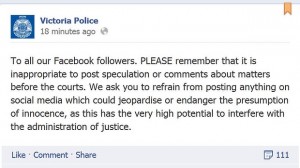
Trial by social media
When an Australian radio journalist by the name of Jill Meagher was found murdered in 2012, it was widely acknowledged that the social media had played an important role in helping to catch the perpetrator after CCTV footage was released and went viral.
However, when a Facebook hate group against the accused was set up and immediately attracted 18,000 likes, the Victoria police felt it had to remind Facebook users of their legal responsibilities:
In 2011, in the United States, the trial of Casey Anthony, charged with murdering her daughter whom she had previously reported “missing”, was subsequently labeled by Time magazine as the “social media trial of the century”. Analyzing the phenomenon at the time, marketing blogger Megan Marrs described how, “Media organizations set up twitter accounts that provided instant tweets on the case’s play-by-plays, also offering the option to receive text messages on mobile phones when the verdict was reached.” Opinions flew wildly as people speculated on what really happened. The “not guilty” verdict sent twitter users into a frenzy as they tweeted their outrage.
As I write, we have the ongoing trial of Oscar Pistorius accused of murdering his girlfriend, during which journalists, key officials and commentators have taken to the social media to relay each development in snappy one liners.
Although the details of each case are vastly different, we are now experiencing the first real social media trial of our own, as the proceedings of the compilation of evidence in the Erin Tanti case emerged live from the courtroom minute-by minute this week.
In their haste to be the first ones to “get the story out there” and attract readers eager to lap up all the salacious details, errors of judgement are being made by some court reporters. Adjectives and interpretations are being annexed to facts to colour the story which are then picked up by the ordinary reader and repeated blindly. We have also been regaled with a number of very intimate details which have not given us any new real information but have only served to quench the public’s thirst for more.
While a few news portals took the precaution of disabling their comments function, that gesture was rendered pretty much redundant once the court reports were shared on the social media where gate-keeping is non-existent and people continued to discuss every fresh detail freely on FB.
With the Internet, freedom of expression has been taken to another unprecedented level and that in itself is a great thing. But, there is always a “but”.
As has often been noted, today everyone is not only a “journalist” and a “columnist” but also a publisher. So while it is true that you cannot control the Internet, I do wonder whether people are really aware that they and they alone are responsible for the opinions and potentially libelous comments which they are posting online? With traditional print and broadcast media, there is a form of hierarchy in the form of editors and heads of news who (should) double check the veracity of what their journalists/columnists are writing before they press the publish button or transmit a news item on air. It is a form of mechanism which is there to hold the media outlet accountable as well as to protect it from lawsuits, but more importantly it is also there to protect the reputation of the person who is being written about, especially if he is a private citizen. Those who work in the media cannot afford to get things wrong because they not only risk losing their jobs but, perhaps even worse, their credibility.
With social media (from Facebook, Twitter, personal blogs or any other platform) no one will protect you if someone decides to sue you for libel, as recent cases which have reached the courts have shown. I believe 100% in free speech as long as it is done responsibly and does not cross what sometimes can amount to a very fine line (and that is why most media professionals worth their salt are very careful on how they phrase and communicate their opinions, even if it is simply a FB status). Those who don’t exercise any caution usually find that there are consequences, and this holds true all over the world.
I must stress that this is not a call for censorship or a desire to gag anyone, but simply to point out that going around saying “I am entitled to my opinion” just does not cut it once you start putting into writing certain arbitrary statements as if they were facts. And there is the crunch, of course, when it comes to the Internet, because once you have put something down in writing, it can be (and will be) used against you. No matter how frivolous, trivial or hilariously funny it might appear to you. Careless comments have even cost people their jobs.
One PR executive (no less) who found this out the hard way was Justine Sacco (employed with media company IAC). While waiting for her flight to South Africa at Heathrow airport last December she tweeted “Going to Africa. Hope I don’t get AIDS. Just kidding. I’m white!”
Funny, right? Uhm, no, not really, not to South Africans it wasn’t and certainly not to those who have AIDS. The tweet went viral and caused an international uproar, but despite apologizing and closing down her Twitter account, she was given the sack.
Social media are an amazing tool which I personally could not imagine doing without because, in my profession, the ability to access immediate information is so vital. But like the mainstream media, social media also bring with them their share of responsibilities; perhaps even more so, precisely because the swiftness with which information is shared make them so powerful.
Yes, on the Internet comment is free. But I guess what I am saying is that, before you turn so eagerly to your keyboard because you are entitled to your opinion, it would not be amiss to think carefully about what you are going to write and to exercise just a little bit more restraint.
- April 13, 2014 2 Comments Posted in: Opinion column






